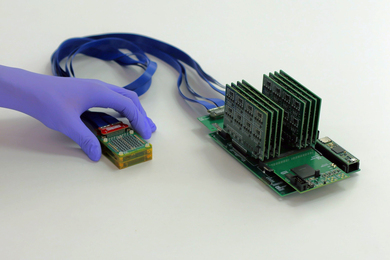The Deshpande Center for Technological Innovation at MIT today announced it is awarding $1,030,000 in grants to ten MIT research teams currently working on emerging technologies. These projects have the potential to revolutionize disease therapies, nano-scale imaging, renewable energy from biomass, energy storage, HIV care in the developing world, wound healing, medication delivery and explosives detection.
"MIT faculty and students constantly demonstrate amazing creativity," said Leon Sandler, executive director of the Deshpande Center. "We give the researchers working on these high risk, high potential projects the resources and assistance to prove their technologies. Since this smoothes the way for funding by commercial investors, we ultimately enhance the quality of life by moving innovative technologies from the labs at MIT to the marketplace. It's an investment in the future."
Each spring and fall, the Deshpande Center awards Ignition Grants and Innovation Grants, which fund proof-of-concept explorations and validation. Since 2002, it has funded 68 MIT research projects with approximately $8 million in grants, acting as a catalyst for innovation and entrepreneurship and allowing MIT technologies to benefit the quality of life. Eleven projects have spun out of the center as independent startups, having collectively raised over $90 million in outside financing from investors.
The fall 2007 grant recipients are:
Yet-Ming Chiang, professor, materials science and engineering: Continuous drug delivery--A new device to provide medicine through a portable delivery device to assist individuals with chronic diseases (renewal from fall 2006 grant round).
Utkan Demirci, affiliated faculty, Harvard-MIT Division of Health Sciences & Technology: CD-4 T lymphocyte-counting microchip--A disposable CD-4 T lymphocyte-counting microchip providing fast, cost-effective on-site HIV virus monitoring to improve patient care in the developing world.
Elazer Edelman, Thomas D. & Virginia W. Cabot Professor of Health, Sciences and Technology: Drug delivery for heart surgery patients--A unique means of safely administering peri-operative drugs for heart failure patients.
Gerald Fink, professor, biology; member, Whitehead Institute: Compound to enhance immune stimulation--A compound to stimulate a more powerful immune response to specific monoclonal antibodies, potentially enabling development of effective new disease therapies.
Carol Livermore, assistant professor, mechanical engineering, and Timothy Havel, principal research scientist, nuclear science and engineering: Energy storage in carbon nanotube super-springs--A dramatically improved mechanical energy storage system that could lead to new products such as mechanical watches than run for a month between windings (renewal from fall 2006 grant round).
Keith Nelson, professor, chemistry: Power source for terahertz imaging--A compact power source enabling safe and efficient terahertz imaging for explosive detection and other applications.
Donald Sadoway, professor, materials science and engineering: High-amperage energy storage device--A new technology to store high-amperage energy for industrial settings (renewal from fall 2006 grant round).
Henry Smith, professor, electrical engineering and computer science, and Rajesh Menon, research engineer, Research Laboratory of Electronics: High throughput nanoscale imaging--An absorbance modulation technique enabling economical high-resolution, high-throughput, nanoscale imaging for faster, more flexible analysis of nano-structures.
Jefferson Tester, H. P. Meissner Professor of Chemical Engineering: Renewable propane from biomass--Technology to allow the production of propane from biomass, such as sugar, starches, or cellulose.
Ioannis Yannas, professor, mechanical engineering, and François Berthiaume, lecturer, mechanical engineering: Drug delivery system to enhance healing of wounds and burns--Novel skin substitutes designed to accelerate blood vessel growth, improve wound and burn healing, and to reduce the risk of infections.
The Ignition and Innovation grants help recipients assess and reduce the technical and market risks associated with their innovations. In addition to financial support, the Deshpande Center's network of entrepreneurs, venture capitalists, and academic and legal experts helps recipients assess the commercial potential of their innovations and make decisions that accelerate progress toward the development of business plans or licensing strategies.
MIT faculty interested in securing a Deshpande Center Ignition or Innovation grant should submit a pre-proposal in May 2008 for the fall 2008 funding round. For more information on how to submit a pre-proposal see: http://web.mit.edu/deshpandecenter/instructions.html
A version of this article appeared in MIT Tech Talk on October 24, 2007 (download PDF).





